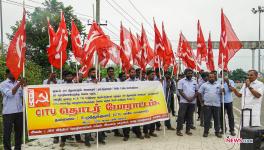IBC Amendment to Reiterate High Priority to Clearing Workmen’s Dues
Kolkata: With the prescribed top priority to the payment of workmen’s dues suddenly under a cloud following an appellate tribunal’s recent ruling, the Ministry of Corporate Affairs (MCA) is to push for an amendment in the Insolvency and Bankruptcy Code (IBC) to reiterate the top priority and thereby set at rest all doubts that have cropped up after the ruling.
The proposed amendment in the IBC will also seek to restore the payout primacy for banks (financial creditors) and role of committee of creditors (CoC), which is a panel comprising senior executives of banks. As is known, banks are all secured creditors. The other amendment objectives include strengthening the hands of home buyers against bankrupt property developers and fixing of longer but ‘strict’ timeline for resolution process completion.
Workmen’s dues and the other two issues came under a grey zone after a ruling by the National Company Law Appellate Tribunal (NCLAT) in the Essar Steel case. This ruling placed operational creditors (service providers) – who, in terms of payout priority rank below banks – at par with banks. Service providers are unsecured creditors.
Under Section 53 of the IBC 2016, workmen’s dues and payout to banks have the same high priority. What the NCLAT ruling did, in effect, was to accord a higher priority to service providers and thereby lower the priority for banks. Moreover, there was no mention of workmen’s dues. The confusion stemmed from this situation and the MCA’s amendment move has to be seen against this backdrop, say informed quarters.
Under Section 53, the payout to workmen will be for 24 months preceding the liquidation commencement date. It has been emphasised in the section that the term ‘workmen’s dues’ shall have the same meaning as assigned to it under Section 326 of the Companies Act, 2013.
The Companies Act section stresses overriding preferential payments and clarifies that workmen’s dues includes all wages or salary including salary earned by way of commission and compensation payable under the Industrial Disputes Act, 1947, all accrued holiday remuneration, all sums due from provident fund, pension fund and gratuity fund or any other fund for the welfare of workmen maintained by the company.
The amendment will ensure that banks continue to enjoy the high priority accorded to them for their receiving payments from the proceeds. Also, CoC will continue to have a meaningful say in the distribution of proceeds. The NCLAT ruling robbed CoC of this “privilege”, explain informed sources.
It, however, remains to be seen whether the operational creditors (service providers), who are unsecured creditors, are reverted to where they are placed in terms of priority currently or they are offered “some sops; after all, they too have lobbying capability”, point out sources.
Property developers usually have a large number of creditors who obviously include home buyers and bond holders. In fact, usually home buyers are the biggest sources of funds for developers. The objective of the proposed amendment is to make decision-making easier and quicker even when a large number of them do not take part in voting on a particular issue. If more than half of these creditors, who are present, approve a plan, it will be considered that the entire class of creditors has approved it.
The timeline for resolution is proposed to be extended to 330 days, which is to be strictly enforced. It may be mentioned in this context that under Section 12 of the IBC, the prescribed timeline is 180 days. If the adjudicating authority is convinced that a resolution case at hand cannot be concluded in 180 days, it can extend the duration by 90 days. Which means in exceptional cases, the timeline can be 270 days.
Now, the MCA, in appreciation of the ground realities, proposes to extend the timeline to “strictly-to-be enforced” 330 days and this total period will now include legal challenges, if any. The MCA secretary Injeti Srinivas is on record saying if resolution process extends the limit (330 days), on 331st day “the corporate debtor will automatically go into liquidation”.
Also read: Setback for Banks: NCLAT Elevates Operational Creditors, Reduces Importance of COC
Get the latest reports & analysis with people's perspective on Protests, movements & deep analytical videos, discussions of the current affairs in your Telegram app. Subscribe to NewsClick's Telegram channel & get Real-Time updates on stories, as they get published on our website.
























